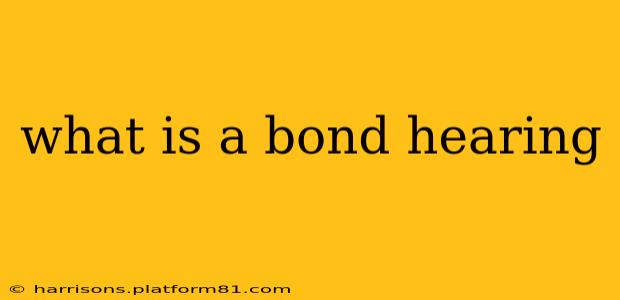A bond hearing, often referred to as a bail hearing, is a crucial legal proceeding that occurs after someone is arrested and charged with a crime. It's the court's opportunity to determine whether the accused should be released from jail before their trial and, if so, under what conditions. This process is fundamental to the American justice system, balancing the rights of the accused with the need to protect public safety.
The outcome of a bond hearing significantly impacts the accused's life in the interim period before trial. Being released allows them to maintain employment, family relationships, and prepare their defense. Conversely, remaining in jail can severely disrupt their life, potentially leading to job loss, family strain, and difficulties in building a strong defense.
What Happens During a Bond Hearing?
A bond hearing typically involves the following steps:
- Presentation of the Charges: The prosecutor presents the charges against the defendant, outlining the alleged crime and its severity.
- Defendant's Plea: The defendant will enter a plea (guilty, not guilty, or no contest). This plea, however, doesn't determine the outcome of the bond hearing itself.
- Prosecutor's Argument for Detention: The prosecutor will argue why the defendant should remain in jail, often citing concerns about flight risk (the defendant may flee to avoid prosecution), danger to the community, or the seriousness of the charges. They may present evidence to support their claims.
- Defense Attorney's Argument for Release: The defense attorney will counter the prosecutor's arguments, advocating for the defendant's release. They may emphasize the defendant's ties to the community (job, family, residence), their lack of prior criminal record, and the strength of their defense. They may also propose specific conditions for release, such as house arrest or electronic monitoring.
- Judge's Decision: The judge weighs the arguments presented by both sides and considers the specific circumstances of the case. They then make a decision on whether to grant bail and, if so, the amount and conditions of the bond.
Types of Bond
Several types of bonds might be set during a hearing:
- Cash Bond: The defendant must pay the full amount of the bond in cash.
- Surety Bond: The defendant pays a percentage of the bond amount to a bail bondsman, who then posts the full amount to the court.
- Property Bond: The defendant uses their property as collateral.
- Personal Recognizance (PR): The defendant is released without having to pay any money, promising to appear in court. This is typically granted for less serious offenses and individuals with strong community ties.
- Unsecured Bond: Similar to PR, but the defendant is responsible for the full bond amount if they fail to appear in court.
What Factors Influence a Judge's Decision?
Judges consider various factors when deciding on bond, including:
- The severity of the crime: More serious crimes, such as murder or armed robbery, often result in higher bonds or denial of bail.
- The defendant's criminal history: A history of failing to appear in court or prior convictions will likely result in a higher bond or denial of bail.
- The defendant's ties to the community: Strong ties, such as employment, family, and residency, increase the likelihood of release.
- Flight risk: If the judge believes the defendant is likely to flee, they may deny bail or set a high bond.
- Danger to the community: If the defendant poses a threat to public safety, the judge may deny bail.
What if Bail is Denied?
If bail is denied, the defendant will remain in jail until their trial. They can appeal the judge's decision, but this process can be lengthy and complex.
How Can I Prepare for a Bond Hearing?
If you or someone you know is facing a bond hearing, it’s crucial to secure experienced legal representation immediately. A skilled attorney can present the strongest possible case for release, maximizing the chances of a favorable outcome. Gathering supporting documentation, such as employment records, family information, and any evidence supporting the defendant's case, is also essential.
This information is for educational purposes only and is not legal advice. Always consult with a qualified legal professional for advice regarding your specific situation.
